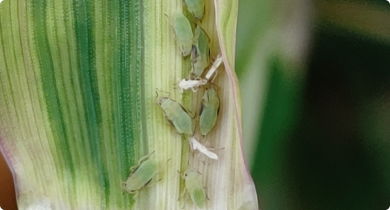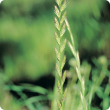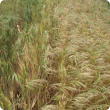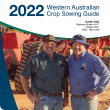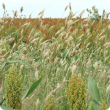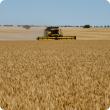Crops
The Department of Primary Industries and Regional Development continues to support the growth and international competitiveness of all crop industries in Western Australia.
With a 2400 kilometre span from its tropical north to its temperate south, WA supports a broad range of cropping industries from rain-fed winter cereals through to irrigated horticultural crops.
In the 2012/13 year the WA cropping industries exported a total of $3.9 billion which comprised: $3.1 billion of cereals, $859 million of pulses, pastures and oilseeds, $142 million of horticultural crops. The major contributors to these exports were wheat ($2.7 billion), canola ($756 million), barley ($377 million), lupins ($42 million), carrots at $48 million, oats ($12 million), and strawberries at $5.5 million.
Filter by search
Filter by topic
- (-) Remove Grains research & development filter Grains research & development
- Grains (208) Apply Grains filter
- Pests, weeds & diseases (71) Apply Pests, weeds & diseases filter
- Production & postharvest (70) Apply Production & postharvest filter
- Wheat (62) Apply Wheat filter
- Canola (62) Apply Canola filter
- Diseases (34) Apply Diseases filter
- Weeds (31) Apply Weeds filter
- Control methods (31) Apply Control methods filter
- Climate, land & water (29) Apply Climate, land & water filter
- Crop weeds (28) Apply Crop weeds filter
- Crop diseases (26) Apply Crop diseases filter
- Sowing (25) Apply Sowing filter
- Chemicals (24) Apply Chemicals filter
- Soils (21) Apply Soils filter
- Barley (21) Apply Barley filter
- Plant nutrition (19) Apply Plant nutrition filter
- Fungi (19) Apply Fungi filter
- Fertiliser (17) Apply Fertiliser filter
- Managing soils (16) Apply Managing soils filter
- Lupins (13) Apply Lupins filter
- Soil management (11) Apply Soil management filter
- Mechanical, physical and cultural (11) Apply Mechanical, physical and cultural filter
- Soil acidity (11) Apply Soil acidity filter
- Pulses (10) Apply Pulses filter
- Breeding & varieties (10) Apply Breeding & varieties filter
- Liming (9) Apply Liming filter
- Pests (9) Apply Pests filter
- Oats (8) Apply Oats filter
- Herbicides (8) Apply Herbicides filter
- Fungicides (8) Apply Fungicides filter
- Water repellence (7) Apply Water repellence filter
- Pest insects (7) Apply Pest insects filter
- Harvesting (7) Apply Harvesting filter
- Pastures (7) Apply Pastures filter
- Genetic modification (6) Apply Genetic modification filter
- Climate & weather (6) Apply Climate & weather filter
- Soil constraints (5) Apply Soil constraints filter
- Chickpeas (5) Apply Chickpeas filter
- Frost (5) Apply Frost filter
- Viruses & virus-like (4) Apply Viruses & virus-like filter
- Pasture management (4) Apply Pasture management filter
- Soil compaction (3) Apply Soil compaction filter
- Irrigated crops (3) Apply Irrigated crops filter
- Food, export & investment (3) Apply Food, export & investment filter
- Agribusiness Food & Trade (3) Apply Agribusiness Food & Trade filter
- Investment attraction (2) Apply Investment attraction filter
- Field peas (2) Apply Field peas filter
- Investment (2) Apply Investment filter



